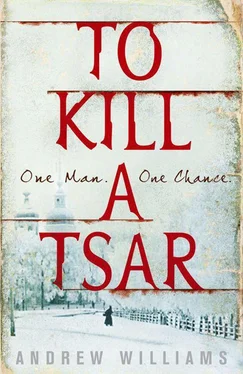‘The financial controller?’
‘Yes.’
‘Well, that is a different matter, yes.’ Mikhailov was impressed. ‘But is he with us?’
‘He’s not against us. I think he can be persuaded…’ She paused, as if in two minds whether to say more.
‘Well?’
‘He likes me.’
Mikhailov chuckled and took a step forward to place a hot plump hand on her upper arm. ‘We all like you, Anna.’
She shook it free at once, grateful that the darkness was covering the colour she could feel in her face. ‘He may be useful, that’s all.’
‘Yes, he may.’ There was nothing in Mikhailov’s voice to suggest he felt any embarrassment. ‘Just be careful.’
‘Of course. It’s not me you need to speak to.’
‘Oh?’
And she told him of Goldenberg’s plan to kill the head of the Third Section. ‘The doctor must have overheard him. I tried to convince him it was just silliness, but he isn’t an idiot.’
Mikhailov turned away from her and stepped back to the open door, his head bent, pulling distractedly at his thick beard.
‘All the more reason to be careful,’ he said at last. ‘I will speak to Grigory. The time isn’t right for another attempt.’
They made their way back along the corridor but at the refectory door Anna stopped and, without turning to look at him, said, ‘Did you hear of Alexander?’ Her voice shook a little with emotion.
‘He showed great courage on the scaffold.’
‘You were there?’
‘No. But Popov was there.’
‘Popov?’
‘The student I brought with me tonight.’
Turning the handle sharply, she pushed the door open and walked purposefully into the refectory. They all knew the risk they were taking. Time mourning her friend was time that should be spent fighting for the revolution he gave his life for. What was it Mikhailov had said to them all on the eve of the attempt? ‘We can do anything if we are not afraid of death.’ Alexander Soloviev had not been afraid.
Goldenberg and Evgenia Figner had been joined at the table by Morozov and Kviatkovsky, Presnyakov and other familiar faces.
‘Thank you for coming, comrades,’ said Mikhailov, pouring himself a glass of tea. ‘We are running a risk, meeting so soon after Alexander’s death, but I have some important news. A conference has been called to discuss our ideas for a new party.’
It would be held at a city in the south-west, he told them, invitations delivered by hand to socialist groups all over Russia. ‘This is our chance to argue the case for our campaign. The people want us to lead them and they need something to fight for.’ To prepare for the conference, they must visit supporters and raise money. It would have to be done in complete secrecy.
‘And that brings me to the spy, Bronstein.’ Mikhailov placed his glass on the table and clasped his hands together like a priest in prayer. ‘Madame Volkonsky’s house is being watched. No one should go there or try to contact her. Our friend Popov,’ and he nodded towards the unprepossessing figure lurking at the fringe of the circle, ‘has been making contacts with the workers at the Baird Foundry but he is being watched by another informer. You seem to attract them like flies to dung, don’t you, Popov? Tomorrow he will leave the city. And you, Grigory,’ he said, turning to Goldenberg, ‘you must leave too.’
Goldenberg’s face fell. ‘Why me? How can you be sure they’re looking for me? I don’t…’
Mikhailov cut him short. ‘You know better than to ask.’ No one in the group doubted that Mikhailov knew of what he spoke. Time and again he had presented them with startling intelligence, like a magician pulling a rabbit from a hat. His sources were jealously guarded, and the group was obliged to take what he told them on trust. Knowledge is power, he had told them, when speaking of their struggle, and his unique access to it placed him first among equals.
The conversation turned to the formation of workers’ groups, new cells in the army and navy, and of Mikhailov’s plans for a printing press. At a little before ten o’clock the meeting broke up and they began to slip into the night in ones and twos.
‘Did you instruct Popov to — to deal with Bronstein?’ Anna asked when she was alone again with Mikhailov. They were standing at the front door waiting for the yard keeper to return and lock the school.
‘Why do you ask?’
She paused to consider her words carefully. ‘Is it right that one person can take the decision to kill in the name of the group?’ she said at last.
‘Don’t you trust me?’
‘That isn’t the point.’
‘Anna. Think.’ And for once his soft at-your-service voice was sharp with impatience. ‘You know perfectly well that in such cases there isn’t time for a motion and a vote.’
Mikhailov was right, she knew that, and yet she felt uneasy. It must — as always — have been written in her face.
‘Is there more?’ he asked, his small brown eyes hunting for hers. ‘Is there something you aren’t telling me? Perhaps this English doctor?’
‘Don’t be foolish.’
But the clever little smile had returned to Mikhailov’s face. ‘Let’s hope he is a servant to the movement. We’ll know soon enough, won’t we?’
‘Yes.’ Her voice was a little husky, barely more than a whisper: ‘Yes, we will.’
It was clear from his restless movement that the yard keeper did not relish the opportunity he had been presented with to serve his tsar.
‘Calm down, man, for God’s sake.’
Major Barclay had no time for his squeamishness. What was his name? Barclay had forgotten. These smelly gatekeepers all looked the same with their padded jackets and shaggy beards. They were side by side beneath the carriage arch of a large terracotta-coloured mansion block, the soft early sun blinking over the roof of the building opposite. Five minutes to the signal. His men were in place. Both ends of the 3rd Izmailovsky Regiment Street and the open courtyards in the district sealed. Two entrances to the apartment block. The front covered from the building on the opposite side of the street, and the back by a dozen gendarmes in the doorways and shadows of an especially gloomy little yard. If he had any sense, Popov would have reconnoitred a number of escape routes, but Barclay was confident he had covered all the possibilities. He glanced at his pocket watch: ‘All right, it’s five, let’s get him.’
Grasping the dvornik’s upper arm, he led him none too gently into the street then almost immediately right through the open doorway of the mansion block. He knocked lightly at the first apartment he came to and Kletochnikov opened the door. In the room behind him another agent — Postnikov — dressed as a labourer in a peaked cap and short woollen coat.
‘Check your weapons again,’ said Barclay, drawing his own Smith and Wesson: six good .44 Russian cartridges in the cylinder. Then turning to the dvornik: ‘It’s up to you now.’ The man was shaking like a leaf. ‘Come on, you were in the army, weren’t you?’ Barclay placed a firm hand on his shoulder. ‘He isn’t expecting us. Remember, stand aside as soon as he opens the door. Have you got the letter?’
Rummaging inside his padded jacket, the yard keeper pulled out an envelope and offered it in a trembling hand to Barclay.
‘No, no. Dmitry, isn’t it? Dmitry, you give it to Popov.’ He tried to keep the frustration from his voice.
Anxious to get the business over with, the silly Ivan began thundering up to the first landing at a pace unknown to his breed.
‘Wait!’ Barclay hissed. ‘Wait there.’ He turned to Kletochnikov. ‘You first.’ He nodded to the stairs. ‘I’ll follow in thirty seconds. Go.’
Читать дальше












